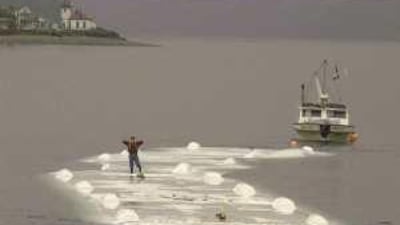In the film Brewster's Millions, the eponymous hero Monty is tasked with getting rid of US$30 million (Dh110.1m) in 30 days. If he succeeds, he will inherit $300m. Blowing that sort of money is not easy unless you are a central banker, who will routinely waste that much daily, sometimes even before lunch. One of Brewster's schemes to offload the loot is to invest in a company that ships icebergs from the Arctic to the Middle East. Against all the odds, the company is successful and poor old Brewster has to come up with another wheeze to lose money.
Terry Spragg has a similar idea. But it is not towing icebergs, which let's face it are hard to come by these days and even if you find one it probably has either a polar bear or a Greenpeace protester onboard. Sometimes both. His plan is to ship large bags full of water from areas of plenty to arid areas. Over the past 20 years he has designed and constructed large polypropylene bags that can be filled with fresh water, zipped together and pulled by a tug. The economics are simple and relatively sound. Some places have too much water; others have none.
He is looking for about $1m to launch a demonstration voyage from Manavgat River in Turkey, which already has all the facilities in place for loading fresh water, and shipping the water to Gaza in Palestine. He plans to raise sponsorship rather like the Goodyear blimp, except instead of taking to the skies, his advertising banner will be floating in the water like a giant whale. "It will be bigger than Richard Branson going round the world in his balloon," he says. "The media coverage would be huge."
Shipping water by tug is in his view a feasible and sensible alternative to building giant water pipelines. The GCC, for example, has a plan to link its desalination plants with a $2 billion pipeline. When the Iraqis invaded Kuwait, one of the first things they did was to blow up Kuwait City's desalination plants. Without water, a city grinds to a halt as quickly as a man in the desert without a water bottle.
Mr Spragg says he can ship water for a reasonable cost - just 40 to 50 cents per cubic metre - which compares favourably to the cost of desalinated water, which often comes out at a rate closer to $1 per cubic metre. And that is before you even start to move it around the country. Of course in many parts of the world there is still resistance to people paying a reasonable price for water. Water is subsidised in many places.
In the UAE, it is virtually free if you are a national. This no doubt contributes to the rather chilling statistic that the country, despite being essentially desert, is the largest consumer per capita of water in the world Even in the US, the supposed home of the free market, water is subsidised. I once attended a meeting at the City Hall in Los Angeles, where a representative of the World Bank was outlining the benefits of privatisation.
The mood from the assembled union leaders was little short of mutinous. Unsurprisingly, little has changed in California, except there is less water to go around. Mr Spragg's bags, despite being a bit wacky, sound like an eminently sensible idea. (You can see a video demonstration on YouTube.) So why, you might ask, has Mr Spragg had to spend more than 20 years trying to get the bags filled with water and shipped elsewhere? The answer according to Mr Spragg is politics.
"The key thing is the politics of water," he says. "We are getting closer both in America and Australia, with questions being asked in the Australian government." Another reason might be people's resistance to innovation and change. David Zetland, an economist who runs a blog called Aquanomics, says "Terry Spragg has spent more than 20 years trying to get people to consider his good idea, but he's run into an engineering culture that prefers pipelines over solutions that may cost 90 per cent less".
Mr Zetland and I agree that one of the solutions to the world's water problems is to start charging a realistic rate for it. The most fundamental tenet of the dismal science is supply and demand: when there are few strawberries, the price goes up. When there is a glut, you cannot give them away and you have to make jam. Water managers fail to appreciate this simple rule. They either give the water away when there is a lot of it or if it starts to run out, they ration it.
Mr Zetland and I agree on something else, too. Somebody should stump up $1m to give the bags a proper test. If it works, Mr Spragg plans to run turnkey operations for anybody short on water who is willing to pay. Compared with building an expensive pipeline that could easily be tampered with or not needed all the time, his bags could be handy. Scotland, for example, is full of water. The south of England is often without rain in the summer. Bringing water and possibly peace to Palestine would be a start. Perhaps they might even be used to persuade Londoners that there really is a point in subsidising the Jocks, thus answering the West Lothian question once and for all.
rwright@thenational.ae

